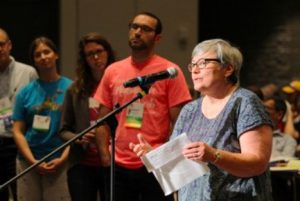. .DISARMAMENT & SECURITY. ,
An article from the Mennonite World Review
Mennonite Church USA delegates on July 6 overwhelmingly passed a resolution on Israel-Palestine, confessing “our own complicity in this web of violence, injustice and suffering” and vowing “concrete steps to address these wrongs.”
At the first business session of the denominational convention, the statement received 98 percent support, with 10 dissenting votes in a delegate body of about 550.

Anita Kehr, representing Western District Conference, speaks during open discussion time on the Israel-Palestine resolution. — Vada Snider for MWR
“Seeking Peace in Israel and Palestine” takes what supporters call a “third way,” opposing the Israeli military occupation while taking a stand against anti-Semitism and affirming the need to build stronger relationships with Jewish communities.
In 2015, delegates tabled an earlier version of the resolution, asking that it be rewritten and brought back in two years.
This time, delegates commended the statement as a humble call for justice that recognizes “the legacy of Jewish suffering is intertwined with the suffering of Palestinians.”
“I feel the resolution is a faithful response to conflict in that region,” said Heidi Regier Kreider, representing Western District Conference. “I believe it allows us to reach out to Jewish and Palestinian communities and be consistent in our call to be peace people.”
Regarding the movement known as BDS — boycott, divestment, sanctions — the resolution aims to offer a unique Mennonite position. It urges avoiding “the purchase of products associated with acts of violence or policies of military occupation.” It does not call for a boycott of all Israeli goods or for academic or cultural boycotts.
The resolution asks the financial agency Everence to convene representatives of Mennonite organizations to “review investment practices for the purpose of withdrawing investments from companies that are profiting from the occupation.”
It urges all church members to review their investments in a similar way.
(article continued in right column)
Presenting the Palestinian side of the Middle East, Is it important for a culture of peace?
How can a culture of peace be established in the Middle East?
(article continued from left column)
Making confessions
“[W]e confess and lament the ways we have supported the military occupation, which has grievously harmed and traumatized the Palestinian people and has not served the well-being and long-term security of Israelis,” the resolution states.
Specific points of confession include “embracing or tolerating Zionist theology,” accepting negative stereotypes of Palestinians based on “anti-Muslim and anti-Arab biases” and contributing tax dollars to military aid to Israel.
The resolution does not endorse either a one-state or two-state solution in Israeli-Palestine. “We hear a call from both Jews and Palestinians,” it says, “to have a state . . . that protects their unique cultures, civil rights, freedoms, security and dignity.”
Delegates overwhelmingly expressed support.
Emily Hedrick of Lima Mennonite Church in Ohio said she had been “looking for a peace witness in this generation,” which has not faced a military draft, “and I see that in this resolution.”
Ryan Ahlgrim of Richmond, Va., said the resolution was already forming Mennonite Church USA in a positive way by making members intentional about not being anti-Semitic and about caring for Palestinians.
Among concerns expressed, Tim Bentch of Souderton, Pa., felt the statement’s call to end the occupation was “political rhetoric” that hindered the ability of Israelis to hear what the statement is saying.
Michael Crosby of Champaign-Urbana, Ill., said the statement had already opened up new interfaith conversations in his ongoing meetings with a local imam and a rabbi.
Two endorsements
Delegates heard endorsements of the resolution from a Jew and a Palestinian.
Rabbi Brant Rosen, representing the Rabbinical Council of Jewish Voices for Peace, read a statement from the council noting that “within North American Jewish communities, there is a growing desire to end our silence over Israel’s oppressive occupation of Palestine.”
Brant said that as “a Jew and rabbi and a person of conscience” he was deeply impressed with the resolution.
Alex Awad, a Palestinian Christian who has served as a pastor and professor in Israel-Palestine, told of speaking at numerous Mennonite events and visiting in Mennonite homes. He urged support for the resolution and said Christian leaders throughout the Holy Land, where Christianity is in danger of dying out, would be among those who affirm it.